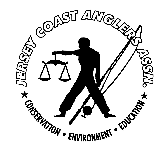
JERSEY COAST ANGLERS ASSOCIATION
Working For Saltwater Resource & Marine Anglers
1201 Route 37 East, Suite 9, Toms River, NJ 08753
Phone: 732-506-6565 Fax: 732-506-6975
Web: http://www.jcaa.org
Email: jcaa@jcaa.org
President Barack Obama
The White House
1600 Pennsylvania Ave., N.W.
Washington, DC 20500
Dear Mr. President,
Jersey Coast Anglers Association (JCAA), a state wide organization representing 75 fishing clubs in New Jersey, was shocked to be informed that Bruce Freemanís candidacy for the Mid-Atlantic Fisheries Management Council (MAFMC) failed to gain support of your Administration. Mr. Freeman enjoyed the strong support of the New Jersey congressional delegation. Both Senator Lautenberg and Senator Menendez wrote letters of support for Bruce Freeman addressed to the Secretary of Commerce Gary Locke, National Oceanic and Atmospheric Administration Administrator Jane Lubchenco and the National Marine Fisheries Serviceís acting Assistant Administrator Jim Balfiger. In addition, Congressmen Pallone and Adler both also wrote to support him. Governor Corzine recognized the outstanding qualities of Bruce Freeman and forwarded his nomination to the National Marine Fisheries Service.
With the appointment of Christopher Zeman, who does not understand or reflect the views of the recreational sector, New Jersey has missed a great opportunity to fill its obligatory seat on the MAFMC with someone who has a balanced perspective and long historic knowledge of fisheries management. Mr. Zeman also lacks the scientific credentials so crucial in this difficult management climate. Mr. Freeman recently retired from the New Jersey Department of Environment Protection, Division of Fish and Wildlife, after more than 25 years of service. During most of that time, he represented the divisionís director to the MAFMC. He has done an outstanding job working to protect our state and national marine resources. His many years of service have provided him with a sound comprehension of the very complex procedures of the MAFMC. His familiarity with many of the council members is a distinguishing characteristic that would have surely added to his effectiveness while serving on the council. JCAA recommended Mr. Freeman primarily due to his strong scientific background and his ability to apply science in decision making. He is known as an independent thinker who is able to look at various perspectives and make the best decisions based on his knowledge of the complex science issues that are ever present in fisheries management.
Since retiring, Mr. Freeman has volunteered his time on the Executive Board of the Jersey Coast Anglers Association; as the Science Advisor to the Partnership for Mid-Atlantic Fisheries Science; and serves as Chairman of our Science and Research Committee where he continues his involvement in marine fisheries, conservation and fishery management. His past experience on the MAFMC made him an exceptional candidate to once again represent New Jersey. Appointing someone lacking these important credentials shows a serious disregard for the 1.3 million recreational anglers who fish in New Jersey and contribute 1.3 billion dollars to our economy each year. Dr. Lubchencoís decision on an appointment to the Council from Virginia showed the same lack of understanding and disregard for the recreational fishing community. This is the first time since 1978 that Virginia and New Jersey will not have a recreational representative on the Council. The rest of the recreational fishing community throughout the United States, numbering 45 million and contributing billions of dollars annually to our economy, is expressing grave reservations about these recent appointments. We notice that Dr. Lubchenco did not change the composition of the New England Council and left all the commercial fishermen in place. What lessons are recreational anglers to draw from these events?
In the future, we are hopeful the Administration will be more sensitive to the important role that recreational anglers throughout the country must play in fisheries management. Historically, recreational anglers have been stewards of the ocean and have been front and center in dealing with environmental issues. We were the driving force for many of the laws (including the Magnuson Stevens Act) that helped manage fisheries. And we have supported every environmental cause that deals with the oceans, streams, bays and estuaries. It is an incorrect assumption that recreational anglers cannot or do not represent environmental concerns. We would argue that we were the first and remain the strongest voice for the environment. JCAA has many board members who also serve on the boards of many environmental organizations. We also hope you recognize, and we are sure your years in Hawaii will confirm, that fishing is a family sport. This is how we teach our young people to be stewards of the ocean and protectors of the oceanís resources.
We hope for a positive reply and look forward to working together. JCAA supports clean energy and your initiatives on climate change. But we need to see evidence that your administration is sensitive to the needs of the 65 million recreational anglers in the United States and their economic value. We will be far more vigilant in securing support for credentialed appointees, such as Bruce Freeman, in the coming years.
Sincerely,
Mark Taylor
JCAA President
|